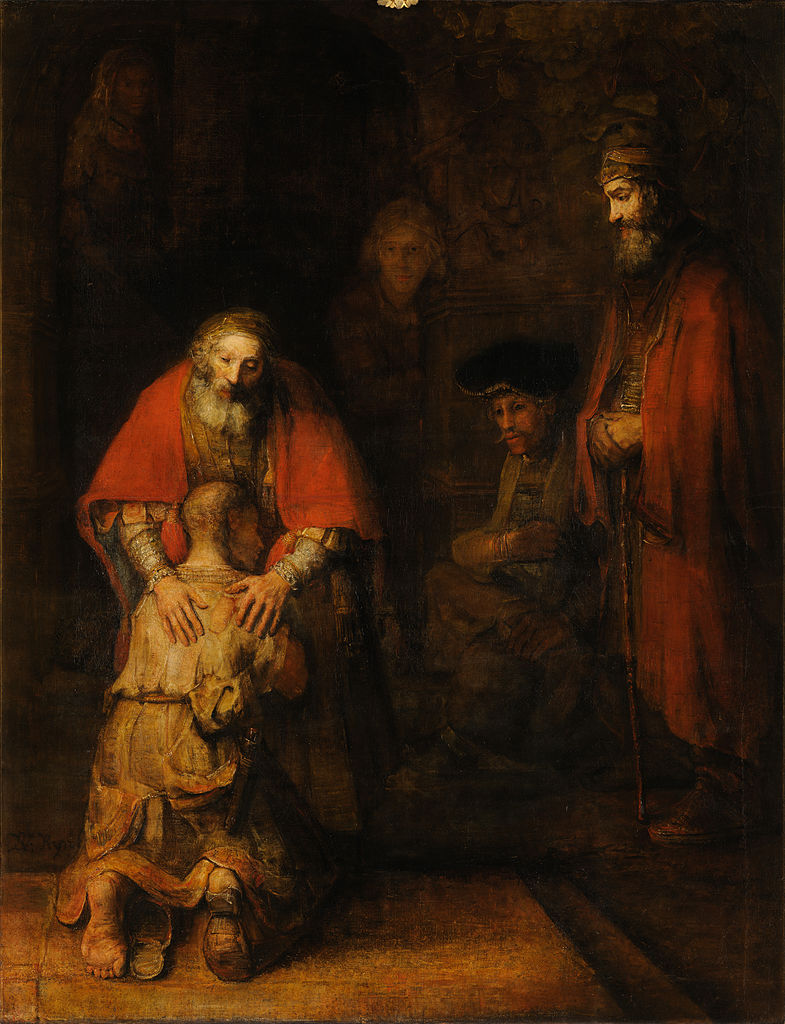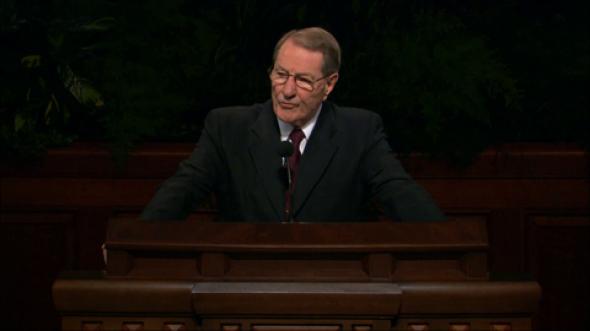Blessings by Laura Story (Music) is a great prelude to studying this lesson.

I saw this a good while ago, and thought it to be an amazing principle. I also thought to myself, "when I teach about Adam and Eve, I will try to incorporate this into it where possible."
It is a beautiful principle, as it focused on the strength that can come when something becomes broken.
In
Sunday School, I always like opening with a hymn that relates to the
lesson. This may be somewhat unorthodox for Sunday School, but not
unheard of.
Sometimes
it is immediately recognized as appropriate, as in using "I am a child
of God" when discussing Lesson 1 "This is My work and My glory," or
making it more thematic when using "If you could hie to Kolob" to
discuss the glory of God's creations (taught last week), and sometimes
it's fun to find new material not often sung about such as "Lord, accept
into Thy Kingdom" when discussing the role of Family History.
It
is a way to set up a good spiritual atmosphere and allow the Spirit to
direct the lesson, as well as preparation for the lesson. Oftentimes I
will try and find a good hymn on the prior Monday that sets the tone for
the week of lesson prep. Leave the window of revelation open though, as
many times I have heard a thought or song the day before or on the way
to church and use that one instead, which makes the lesson that more
clear.
Some may call that an Audible Audible.
 |
| Try saying that 3 times fast, Baba Wawa! |
Anyways, it's a good way to get unified before the lesson and have a good theme in mind for the lesson involved.
This
weeks lesson includes the discussion of Adam and Eve, their role in
establishing a faithful people on the earth, their necessary expulsion
from the Garden of Eden (yes, necessary - more on that later) and their
need for and education of a Savior being prepared from the foundations
of the world.
Some Hymn ideas could include:
"Nearer my God to Thee" discussing
the constant need for the Atonement as well as the Three Pillars of
Eternity (Discussed some last week and continued on today)
"Adam-Ondi-Ahman" Can bring discussions into perspective of discussing the development of the Gospel of Jesus Christ since Adam, and he and eve's critical decision to further the work, providing the catalyst for the Redeemer.
"Come unto Him"
would contain similar themes, and gives some insight into how Adam may
have felt after being dismissed from the Garden and came unto Christ and
how we all have a similar journey from one garden (The Garden of Eden)
to another (Gethsemane) and ultimately understanding the third (Garden
Tomb). (Elder McConkie discusses this idea further on).
 |
When I think about the story of Adam and Eve, I think of it as an absolutely glorious series of events. Adam was given instructions in the Garden, with stewardship and authority to govern the creations.
(e.g. Genesis 2:15,19 among others). He was given an helpmeet, and one whom he would be with, even to "cleave unto" her, and set an example of an Eternal marriage, leaving "his father and mother" ... and they shall be one flesh" (Gen. 2:24).
He was given commandments before this process as well: One being from Genesis 1:28, in which is given dominion and authority over the things of the earth, and also to multiply and replenish the earth.
Later on, Adam was given another commandment (2:16-17):
And the Lord God commanded the man, saying, Of every tree of the garden thou mayest freely eat: But of the tree of the knowledge of good and evil, thou shalt not eat of it: for in the day that thou eatest thereof thou shalt surely die.
 |
| Two Trees |
There were many trees, but two stood out:
One; the Tree of Life, in which immortality would remain as their current condition.
The other; the Tree of Knowledge of Good and Evil, the consequence of partaking would then bring death, or mortality.
In addition, the consequences of no longer being able to partake of the free of life automatically and being separated from the Presence of God due to that would occur.
Positive Consequences would also take place. They would receive the benefits from which the tree is named. Knowledge of Good and Evil. Living in a state of constant sameness, however innocent, leaves out opposition. Pleasure, pain, good, evil, light, darkness, bitter, sweet are all relative to knowing the other.
I once watched an episode of Sabrina the Teenage Witch (The one with Melissa Joan Hart) and they discussed this principle as well. It involved a diagram of sorts (at least in my head when it was going on).
1: ______________________________________
Is much different that
2. /\/\/\/\/\/\/\/\/\/\/\/\/\/\/\/\/\/\/\/\/\/\/\/\/\/\/\/\/\/\/\/\/\/\/\
Fig. 2 can be used on a spectrum of how much something is compared to another. For example, the bottom could be sour, and the top could be sweet. The top could be light and the bottom darkness. but you are able to compare and contrast the two, and therefore be able to judge good and evil, pleasure and pain, etc.
Because fig. 1 is constant you have no way of knowing what level you are on. It could be a 10 out of 10, but without anything to compare it to, or always being in that state, there is nothing by which to judge. You could be perpetually happy for your entire life but not no it because nothing evil would change your perception of that.
Satan soon presents himself and sets a pattern that he continues today; namely, giving half-truths.
He was using the commandment given in Genesis 2:16-17 and Genesis 1:29 as a background for it, but only mentions the immediate goodness and eliminates the devastating consequences. "You shall not surely die ... but shall be as gods, knowing Good from Evil" (Genesis 3:4-5). This is typically one of the principles that the adversary exercises: He doesn't eliminate the truth, but mingles lies with scripture.
He also seeks to overthrow the words of the prophets. This will happen more and more, in the Old and New Testaments, as well as the Book of Mormon, and even today.
Adam was given a commandment and the consequences to that commandment, and then it was given to Eve. Satan sought to override that authority and caused them to make the choice to fall. In doing so, Mortality was entered into. No more could they directly partake of the fruit of the Tree of Life automatically, because if they did, they would live forever with a transgression unresolved. Their natures were changed, and they received a corruptible nature; One that would have blood, and all that comes with it: Sickness, disease, pain, as well as the ability to recover, rest, and produce offspring.
It is crucial, as mentioned in last weeks topic that in order for us to fully understand the Atonement of Jesus Christ, we must first understand the Fall, and to understand the Fall, we must understand the Creation.
As with Adam and Eve, so it is with us. They became separated physically and spiritually from God, and would then need to work (Sweat of their brow), raise a righteous posterity, and the sorrows and suffering that accompanies that, and have an enmity towards evil.
John Welch
in one of the best 5 lectures regarding the Sermon on the mount that I
have studied thus far recognizes Enmity and Anger and their purposes.
"What does the devil do with that enmity? He says, fine—all right, God, you have let evil into the world; then I will take that evil and with it I will make people hate one another. He misdirects our hatred and our anger—a typical strategy that Satan is going to try to employ. Jesus says if we are going to reverse that, we've got to rid our lives of anger and hostility, especially toward a brother."
"The three pillars of eternity, the three events, preeminent and
transcendent above all others, are the creation, the fall, and the
atonement. These three are the foundations upon which all things rest.
Without any one of them all things would lose their purpose and meaning,
and the plans and designs of Deity would come to naught.
If there had been no creation, we would not be, neither the earth, nor
any form of life upon its face. All things, all the primal elements,
would be without form and void. God would have no spirit children; there
would be no mortal probation; and none of us would be on the way to
immortality and eternal life.
If there had been no fall of man, there would not be a mortal probation.
Mortal man would not be, nor would there be animals or fowls or fishes
or life of any sort upon the earth. And, we repeat, none of us would be
on the way to immortality and eternal life.
If there had been no atonement of Christ, all things would be lost. The
purposes of creation would vanish away. Lucifer would triumph over men
and become the captain of their souls. And, we say it again, none of us
would be on the way to immortality and eternal life"
Elder Bruce R. McConkie also teaches concerning the three elements of the Redeeming plan of God.
This
address is his final conference address, and a treasure to listen to,
watch, and study.
Did you hear that last part? WATCH and STUDY this one.
Before his classic ending lines, he leaves us with this connection of "the three gardens of God"
Did you hear that last part? WATCH and STUDY this one.
Before his classic ending lines, he leaves us with this connection of "the three gardens of God"
"May I invite you to join with me in gaining a sound and sure knowledge of the Atonement.
We
must cast aside the philosophies of men and the wisdom of the wise and
hearken to that Spirit which is given to us to guide us into all truth.
We
must search the scriptures, accepting them as the mind and will and
voice of the Lord and the very power of God unto salvation.
As
we read, ponder, and pray, there will come into our minds a view of the
three gardens of God—the Garden of Eden, the Garden of Gethsemane, and
the Garden of the Empty Tomb where Jesus appeared to Mary Magdalene.
In
Eden we will see all things created in a paradisiacal state—without
death, without procreation, without probationary experiences.
We will come to know that such a creation, now unknown to man, was the only way to provide for the Fall.
We
will then see Adam and Eve, the first man and the first woman, step
down from their state of immortal and paradisiacal glory to become the
first mortal flesh on earth.
Mortality,
including as it does procreation and death, will enter the world. And
because of transgression a probationary estate of trial and testing will
begin.
Then
in Gethsemane we will see the Son of God ransom man from the temporal
and spiritual death that came to us because of the Fall.
And
finally, before an empty tomb, we will come to know that Christ our
Lord has burst the bands of death and stands forever triumphant over the
grave.
Thus, Creation is father to the Fall; and by the Fall came mortality and death; and by Christ came immortality and eternal life.
If there had been no fall of Adam, by which cometh death, there could have been no atonement of Christ, by which cometh life."
One of my absolutely favorite and enlightening discussions of the
atonement is contained in the address of Elder Nelson (Mentioned last week)
 |
| Rembrandt: Parable of the Prodigal Son |
"Rich
meaning is found in study of the word atonement in the Semitic
languages of Old Testament times. In Hebrew, the basic word for
atonement is kaphar, a verb that means 'to cover' or 'to forgive.'
Closely related is the Aramaic and Arabic word kafat,
meaning 'a close embrace'—no doubt related to the Egyptian ritual
embrace. References to that embrace are evident in the Book of Mormon.
One states that 'the Lord hath redeemed my soul … ; I have beheld his
glory, and I am encircled about eternally in the arms of his love.' Another proffers the glorious hope of our being 'clasped in the arms of Jesus.'
Professor Hugh Nibley also addresses it here although he takes longer to get to that point. He's like that
sometimes. It's worth the read though). It involves the root words of
the atonement and these can bring further light and knowledge to many
passages of scripture.
Encircled in the Savior's Love is a great theme taught throughout the scriptures.

| Actually, Lehi said that. |
All of us are broken, imperfect and mortal. As with Adam and Eve, so to with us: we cannot partake of the Tree of Life automatically right now, but we can obtain it in the same way Adam and Eve did. They came to understand that what they did was not frustrating to the Great Plan of the Eternal God, but necessary, so as to understand right and wrong. They could partake fully of the message of Christ. The life and Mission of Jesus Christ was not something that had to be put in place because Satan made two people make a mistake. It was necessary so that we could look to a Mediator, a Savior.
It was put in place so that all of God's children could return to live in the presence of God, this time as perfect, immortal and whole individuals who partook of the fruit of Knowledge of Knowledge of Good and Evil and, through the plan prepared, also partake of the Fruit of the Tree of LIFE, which is now Christ. As we partake of His goodness and mercy, we can draw near to the Father again, even as Adam and Eve did in the garden, except this time comprehending the other gardens of God -- Gethsemane and the Tomb --
Understanding all three events in their wholeness gives me a picture of who I am and what I can become. Though I make mistakes and become broken, One stronger than I can come and make me whole.
Kintsukuroi
With His Stripes
As the Father sent down His Begotten to a world so barren and dry,
As a plant yet so fruitful and tender He would prosper, replenish, and die.
But before His great work was completed, - despised and rejected of men –
Our sorrows would burden His shoulders as His wounds would redeem us from sin.
Though no beauty nor form we desired, we esteemed Him yet smitten of God—
He was wounded for all our transgressions as he sought to be bent ‘neath the rod.
Our peace, with chastisement, He carried; His bruises felt deeper within,
As he was beaten, for all, without mercy, and forsaken because of our sin.
No Gilead’s balm was he offered, no peace nor repose was revealed,
Yet because of His life and
His offering, with His stripes we can fully be healed.
[~Orion Trunk, Written 18Mar2011]
Disclaimer: This blog is a way of expressing my personal opinions thoughts and anecdotes, as well as my personal understanding of the scriptures, and conference addresses. It is not meant as a statement of doctrine, and may not necessarily reflect the views, thoughts, or doctrines of the Church of Jesus Christ of Latter-day Saints.
Disclaimer: This blog is a way of expressing my personal opinions thoughts and anecdotes, as well as my personal understanding of the scriptures, and conference addresses. It is not meant as a statement of doctrine, and may not necessarily reflect the views, thoughts, or doctrines of the Church of Jesus Christ of Latter-day Saints.




I love how you tied it all to the Atonement, & i really love that you were able to stick one of your beautiful poems in there. I think the best point you made is that the Atonement was not a quick fix after Adam and Eve messed up. The more I study, the more I come to understand how carefully and brilliantly orchestrated our second estate would be. It makes my head swim sometimes.
ReplyDeleteUsed it this morning in seminary in teaching Alma 15 (the conversion and forgiveness and "fixing" of Zeezrom). Thanks! Kintsukuroi, indeed!
ReplyDeleteHey, great! glad you enjoyed it. There are a few patchwork parts in this post, but sometimes I think I do that intentionally so as to let people work things out in their minds a little bit. Glad it resonates with you, and hopefully you're able to put your own unique spins on it.
ReplyDeleteI really like that poem as well. Not sure how it came to me, but there are a lot of great doctrine that went into it. (Pretty sure I heard somewhere that he was beaten with 39 stripes instead of 40, which is full forgiveness or pardon, so no mercy). Good stuff! Let me know if there's something you want me to research or explore more.